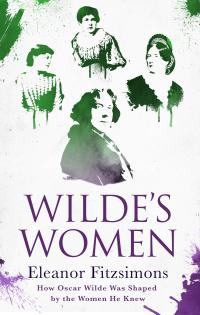Today, I came across a fascinating article on ‘Crinolinemania’, which mentioned the danger of fire and suggested that 3,000 British women died in a ten year period when their crinoline dresses caught fire. Included in the fatalities from crinoline fires at this time were Oscar Wilde’s half-sisters, Emily and Mary.

On Halloween night, 31 October 1871, Emily and Mary Wilde, half-sisters to Oscar, attended a ball at Drumaconnor House in County Monaghan. Towards the end of the evening, Andrew Nicholl Reid, their host, invited Emily to take a last turn around the floor. As they waltzed past an open fireplace, Emily’s crinoline dress brushed against the embers and caught alight. When Mary rushed to her sister’s aid, she managed to set her own dress on fire in the attempt.
Eyewitness reports suggest that Reid wrapped his coat around Emily and attempted to extinguish the flames by rolling her on the ground outside. It seems Mary was left to fend for herself. Describing the incident in a letter to his son William several decades later, John Butler Yeats repeated an account given to him by a Mrs. Hime, a friend who was present that night and had noted the ‘prettiness’ of both young women:
‘After Mrs. Hime had left, one of the girls had gone too close to the fire…with the result that she was instantly in flames…both girls died’.
As is evidenced by the dates recorded in the brief notice that appeared in the Northern Standard on 25 November 1871, the women’s suffering was agonising and prolonged:
DIED
At Drumaconnor, on the 8th inst., Mary Wilde
At Drumaconnor, on the 21st inst., Emma [sic] Wilde
Entries in the Coroner’s Inquisition Book for County Monaghan suggest that this incident was the subject of two separate enquiries. The first examined the circumstances of Mary’s death, referring to her throughout as ‘Miss Wylie’, and her father as, ‘Sir Willm Wylie of Dublin’. Although this may have been a simple spelling mistake, it is perhaps more likely to have been a deliberate attempt to protect William’s good name. Certainly, the report refers to a letter from him requesting that no inquest be held since:
‘doing so, might be of fatal consequence to deceased’s sister, who is dangerously ill from severe burns caused to her while endeavoring to extinguish the burning clothes of her sister’
Confirming the details of Mary’s death, the coroner concluded that everything possible had been done to save her. Poor Emily lingered for almost a fortnight more and a second investigation determined that no inquest was required since both had died accidentally and no intervention would have prevented this. Mary and Emily Wilde were buried in the graveyard of St. Molua’s church in Drumnat, County Monaghan. The headstone erected to commemorate them read:
In memory of
2 loving and beloved sisters
Emily Wilde aged 24
And
Mary Wilde aged 22
who lost their lives by accident
in this parish in Novr 1871
They were lovely and pleasant in
their lives and in their death they
were not divided.
(II Samuel Chap. I, v 23)
William was dreadfully upset by the loss of his daughters: Mrs. Hime insisted that his ‘groans could be heard by people outside the house’. Oscar may not have known his half-sisters but, as he was living at home in Merrion Square when the incident had occurred, he must have observed the decline in his father.
Mrs. Hime’s suggestion that the girls’ mother was with them when they died was supported by local rumour. Anecdotal evidence suggests that, for twenty years afterwards, an enigmatic ‘lady in black’ traveled from Dublin to Monaghan by train, before taking a carriage to Drumsnatt cemetery, where she would stand silently by their graveside. When the churchwarden queried her relationship to the tragic young women, she replied that they had been very dear to her. Although the identity of this veiled woman was never discovered, she was almost certainly the same, ‘woman dressed in black and closely veiled’ who arrived at William’s bedside five years later when he lay dying.
Decades later, Oscar, who campaigned for ‘rational dress’ for women, befriended Henrietta Vaughn Stannard, founder of the Anti-Crinoline League.
More information is available in: Eamonn Mulligan and Fr. Brian McCluskey, “The Replay” – A Parish History (Monaghan, Sean McDermott’s G.F.C., 1984), pp.90-1
and
My book Wilde’s Women.









